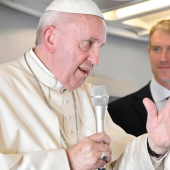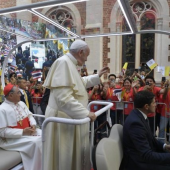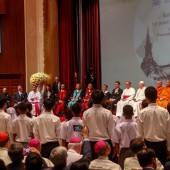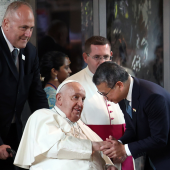Pope Francis praised Thailand for how it had allowed minority Christians to live in harmony with Buddhists for more than four centuries. He was speaking at a meeting with Buddhist Supreme Patriarch Ariyavongsagatanana IX at Wat Ratchabophit Sathit Maha Simaram on Nov 21.
The Patriarch recalled the historic visit of Pope St. John Paul II to his predecessor 35 years ago, a meeting at which he had been present. He then listed visits made by the kings of Thailand to the Vatican in 1897, 1934 and 1960 and spoke of a “deep and lasting friendship.”
The pope confirmed their meeting was taking place “as part of the journey of esteem and mutual recognition initiated by our predecessors.” Recalling the visit of the 17th Supreme Patriarch to Pope Paul VI in the Vatican nearly 50 years ago, he said he wanted to “follow in their footsteps in order to increase respect but also friendship between our communities.”
The pope said these steps “help testify that the culture of encounter is possible, not only within our communities but also in our world, so prone to creating and spreading conflict and exclusion.” Occasions like this “remind us how important it is for religions to become more and more beacons of hope, as promoters and guarantors of fraternity.”
“Since the arrival of Christianity in Thailand some four and a half centuries ago, Catholics have enjoyed freedom in religious practice, despite their being in a minority, and for many years have lived in harmony with their Buddhist brothers and sisters,” Pope Francis said.
He restated his personal commitment and that of the whole Church “to furthering an open and respectful dialogue in the service of the peace and well-being” of the people of Thailand. He said that through scholarly exchanges, “which lead to greater mutual understanding, as well as the exercise of contemplation, mercy and discernment … we can grow and live together as good neighbors.”
The pope called for the development of new charitable projects by members of both religions. These projects should be capable of “generating and multiplying practical initiatives on the path of fraternity, especially with regard to the poor and our much-abused common home,” he said. “In this way, we will contribute to the formation of a culture of compassion, fraternity and encounter. This journey will continue to bear fruit in abundance.”
Source: Ucanews











